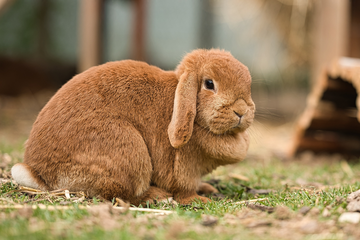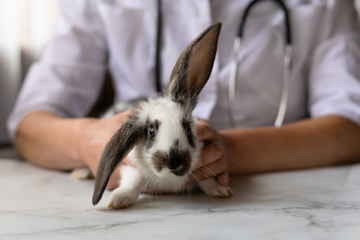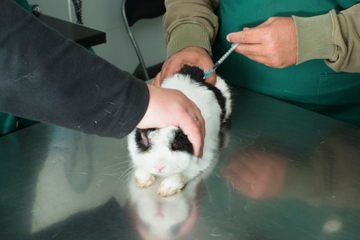Winter Rabbit Diet: What Do They Eat?
Your rabbit is curled up warm and cozy in their hutch, or perhaps they're nestled next to you on the couch, watching snowflakes dance outside the window. A generous pile of Timothy Hay lies in their favorite spot, ready to be nibbled on. Despite the chill of winter, your bunny's well-being depends on maintaining the right nutrition and care. Let's dive into understanding the essentials of a proper winter rabbit diet and how it ensures your rabbit stays healthy, warm, and happy during the colder months.
Click Here For a Guide to Understanding Your Rabbits Diet.

Wild Rabbits and Their Winter Survival Diet
Wild rabbits have evolved to survive in harsh winter conditions, and their diet reflects this adaptability. Unlike the lush greens of spring and summer, winter brings a scarcity of their preferred food. So, what do wild rabbits eat in winter? They rely on two main sources:
1. Bark, Buds, and Twigs
When grass and leafy greens are unavailable, wild rabbits turn to the woody parts of plants. Bark from trees, small twigs, and even dormant buds become their primary source of sustenance. While these are lower in nutrients compared to their usual diet, they help provide essential energy to keep them going through winter.
2. Cecotropes
Wild rabbits consume their cecotropes—special nutrient-rich droppings produced by their digestive system. This behavior allows them to extract maximum nutrition from their food, which is especially vital when resources are scarce. It's an efficient way to recycle nutrients and stay nourished even in the toughest weather.
Understanding Your Pet Rabbit's Winter Needs
Your pet rabbit's diet remains consistent throughout the year, but winter introduces a few unique considerations. Let's address some common questions about your rabbit's needs during the colder months and how the right winter rabbit diet plays a role.

Rabbits Don’t Hibernate
Unlike some animals, rabbits remain active throughout winter. If your bunny appears lethargic or unusually sleepy, it's a sign something may be wrong. Lethargy could indicate an underlying health issue, so consult your veterinarian if you notice changes in their behavior.
Thicker Fur Doesn't Equal Warm Shelter
While rabbits naturally grow thicker fur in winter, this doesn't eliminate their need for proper shelter. Whether indoors or outdoors, ensure their living space is insulated and free from drafts. Outdoor hutches should be weatherproof, elevated from the ground, and stocked with ample bedding to provide warmth.
Timothy Hay: The Foundation of a Winter Rabbit Diet
Rabbits rely heavily on hay, especially during winter. It serves as their primary food source, and consuming hay also helps them generate body heat. In colder months, you may notice your rabbit eating more hay. This increase in consumption helps them build a layer of insulating fat to stay warm.
Always provide unlimited access to fresh Timothy Hay, as it remains the cornerstone of a healthy rabbit diet year-round.
Key Components of a Winter Rabbit Diet
While Timothy Hay remains the staple, a well-rounded winter rabbit diet includes several other components. Here's what you should keep in mind:
Pellets
High-quality rabbit pellets provide additional nutrition to complement their hay intake. Stick to the recommended serving size based on your rabbit's weight, and avoid overfeeding, as too many pellets can lead to obesity.
Fresh Vegetables
Leafy greens like romaine lettuce, parsley, and kale are excellent additions to their diet. During winter, make sure these veggies are fresh and not frozen, as extremely cold food may upset their stomach.
Fruits as Treats
Fruits like apples (without seeds), strawberries, and bananas can be offered sparingly as occasional treats. They're rich in natural sugars, so moderation is key. Too much fruit can lead to digestive issues, especially during winter when your rabbit's system works harder to regulate their body temperature.
Water
Hydration is crucial for rabbits, but winter poses a unique challenge. Ensure your rabbit's water supply doesn't freeze overnight. Using heated water bowls or regularly refreshing their water can prevent dehydration, which can be dangerous in cold weather.
Winter Care Tips Beyond Diet
A proper winter rabbit diet goes hand-in-hand with other aspects of care. Here's how you can ensure your rabbit thrives even as temperatures drop:
Monitor Their Shelter
For outdoor rabbits, make sure their hutch is winter-ready. Add extra bedding like straw or fleece blankets for warmth, and cover the hutch with a tarp or waterproof cover to shield it from snow and rain.
Encourage Exercise
Rabbits need regular exercise to stay healthy and maintain good circulation. Provide safe, sheltered areas where they can hop around and explore. For indoor rabbits, create a designated play zone free of hazards.

Regular Health Checks
Winter can amplify existing health issues, so keep an eye on your rabbit's behavior and physical condition. Check their ears, nose, and paws for signs of frostbite if they venture outside, and ensure their weight stays consistent. Significant weight loss or gain may indicate a problem.
Share the Joy of Rabbits This Winter
Rabbits bring warmth and joy to our lives, especially during the colder months. Why not spread the love? Share photos of your adorable buns with us on Facebook or Instagram. We'd love to see how you're keeping your rabbits happy this winter!
Stock Up on Winter Essentials
Now that you've learned about the perfect winter rabbit diet, it's time to prepare. Shop our online store for all your rabbit's needs, from premium Timothy Hay to cozy bedding and chew toys. Keeping your rabbit healthy and comfortable during winter has never been easier.

Best Spot: Where Can I Buy Rabbit Food

The Rabbit Skeleton System Explained

Should You Get Rabbit Pet Insurance? Here's Everything You Need to Know







